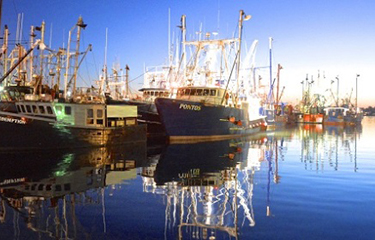New Bedford Port Authority calls for changes to NOAA National Seafood Strategy

The New Bedford Port Authority (NBPA), in the U.S. state of Massachusetts, recently submitted comments on NOAA Fisheries’ National Seafood Strategy, asking the administration remain cognizant of the many challenges the fishing industry faces in the coming decade.
NOAA Fisheries released its draft National Seafood Strategy in February 2023, outlining how the federal government plans to support the domestic seafood sector in the coming years. The strategy, which NOAA said is “based on sound science,” addresses factors affecting the seafood industry, including the financial viability of fisheries and the resilience of coastal communities – like New Bedford, Massachusetts – that depend on them.
New Bedford recorded ex-vessel landings valued at USD 451 million (EUR 412 million) in 2020, supporting a shoreside economy that a study commissioned by the port and Fairhaven Harbor estimated produces 6,808 direct jobs and USD 3.8 billion (EUR 3.4 billion) in business revenue. The statistics make it the highest-grossing U.S. port.
That industry is facing “unprecedented challenges,” and has had to grapple with a web of constantly changing federal regulations, NBPA said.
“Fishermen and the industry as whole have been dealing with varying degrees of federal regulations over the years and have a deep concern that the government may not always be doing what is best to maintain a thriving and profitable fishing industry now and in the future,” the group said.
New Bedford Port Authority Executive Director Gordon Carr said the National Seafood Strategy must go farther in helping the U.S. fishing industry.
“The seafood industry continues to deal with unique challenges, and it is imperative that there is a significant investment in new technologies, research and development, and mitigation from new industries that will share our waters,” Carr said.
Expansion of the U.S. offshore wind industry has been a topic of growing concern to the U.S. fishing industry. The NBPA is calling for some of the revenue the federal government is getting from the wind industry be set aside to address the challenges it can cause to fishing.
“To date, the [U.S.] Bureau of Ocean Energy Management has auctioned over 24.7 million acres for offshore wind in the Atlantic. With these leases comes significant revenue for the federal government. This lease revenue, or a portion thereof, should be used to support scientific survey mitigation work and activities to avoid, minimize, and mitigate the environmental and economic impacts of offshore wind,” NBPA said.
The NOAA strategy should also ensure the U.S. seafood industry can continue to compete with foreign imports at home and abroad, NBPA said.
“It is my hope that NOAA’s National Seafood Strategy will enable American seafood to compete more effectively in foreign markets,” New Bedford Mayor Jon Mitchell said. “As America’s leading fishing port, New Bedford will inevitably benefit from an increase in foreign and domestic seafood sales.”
The authority also highlighted U.S. President Joe Biden’s push for his “30 by 30” goal, which has the goal of setting aside 30 percent of the country’s ocean area for conservation. The NBPA said the complete ban on commercial fishing activities in such a larger area could be devastating for the industry.
“We, and the fishing industry as whole, also have deep concerns with administration’s ‘30 by 30’ order committing 30 percent of our lands and oceans to conservation by 2030,” the NBPA said.
The port authority pointed out that U.S. fisheries are sustainably managed under the Magnuson-Stevens Act, which has been “praised for its success” by environmental organizations and has resulted in U.S. fisheries being ranked among the most sustainably managed fisheries in the world.
“We therefore believe that fisheries in all federal waters outside formal properly-created marine sanctuaries, including fisheries in marine monuments, should be managed sustainably under the Magnuson-Stevens Act,” NBPA said. “There is no scientific justification for the 30 percent number, and no likelihood of increasing our national food security to be derived from closing 30 percent of U.S. waters to sustainable commercial fishing.”
NBPA asked for seat at the table as the government and the seafood industry work on crafting the regulations that will determine what the future holds for the U.S. seafood industry.
“NOAA’s National Seafood Strategy will have a positive effect on our domestic U.S. seafood economy; However, any strategy cannot lose site of the factors impeding industry growth,” the NBPA said.
Photo courtesy of the New Bedford Port Authority





Share